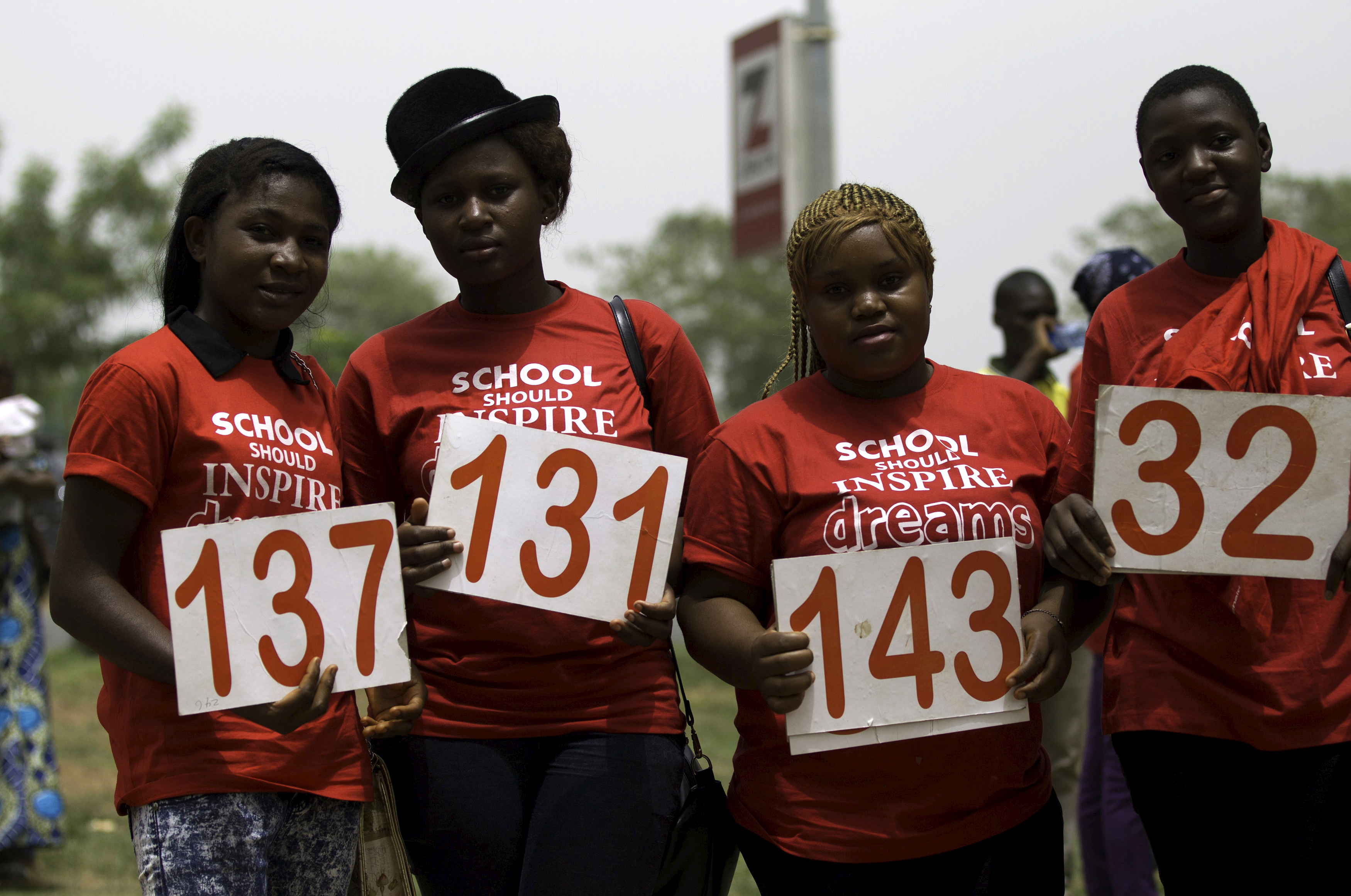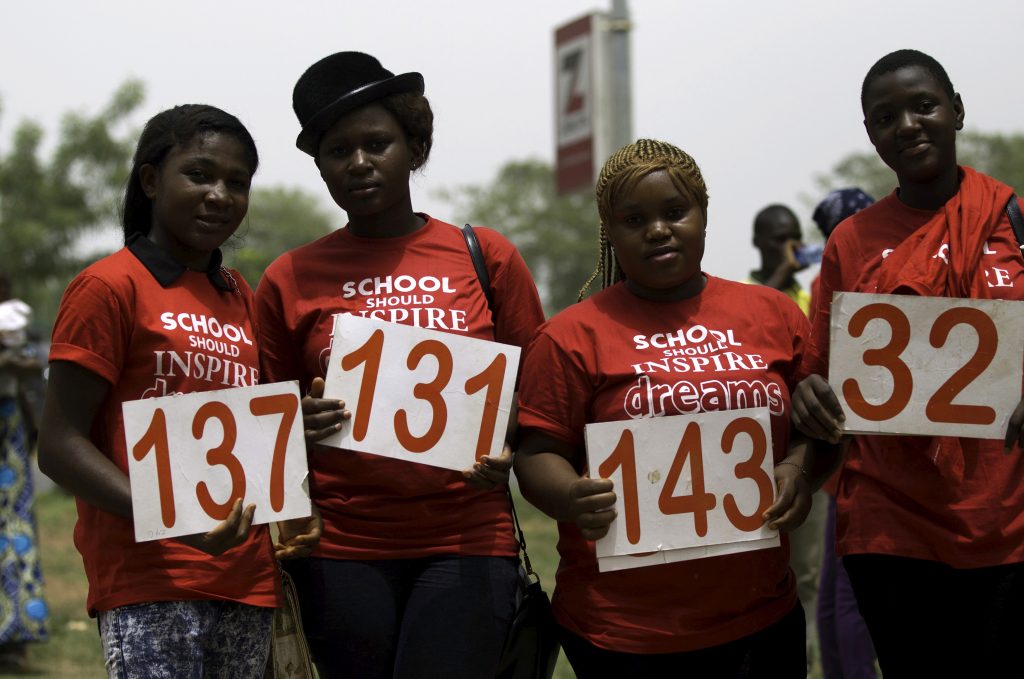
One year since Nigerian schoolgirls’ abduction, larger humanitarian crisis created by Boko Haram needs attention, says Atlantic Council’s Pham
A global campaign that focused attention on the plight of 276 Nigerian schoolgirls abducted by the Islamist militant group Boko Haram a year ago overlooked the region’s larger humanitarian crisis, said Atlantic Council analyst J. Peter Pham.
“Although the smug outsider picking up a celebrity cause in Africa wants to focus on the Chibok schoolgirls, the fact is that thousands of missing women and children must be found and more than a million and a half people need to be resettled,” Pham, Director of the Atlantic Council’s Africa Center, said in an interview.
On April 14, 2014, Boko Haram militants kidnapped the girls—almost all of them Christians—from their school dormitories in the northeastern Nigerian town of Chibok. That sparked a social media campaign, #BringBackOurGirls, which drew support from celebrities around the world.
But the abduction, while a significant tragedy, is just a small part of the bigger, grimmer picture in Nigeria. On the tragedy’s first anniversary, Amnesty International said in a report that Boko Haram has abducted at least two thousand women and girls since 2014, forcing many into sexual slavery. Others have been trained to fight and conduct suicide bombings.
“Boko Haram has displaced, within Nigeria, over a million and a half people and has sent several hundred thousand over the borders as refugees into Niger, Cameroon, and Chad. Last year alone, Boko Haram-related violence killed more than ten thousand people,” said Pham. “So the focus on the girls—at least momentarily—was helpful insofar that it drew attention to the problem of Boko Haram, but in a way it also fetishized the girls to the detriment of the attention paid to the larger humanitarian crisis.”
Muhammadu Buhari, who defeated Nigerian President Goodluck Jonathan in March 28 elections, said April 14 that the Chibok girls’ whereabouts remain unknown.
“As much as I wish to, I cannot promise that we can find them,” Buhari said in a statement.
Boko Haram, whose name in the local Hausa language means “Western education is sinful,” has sought to establish an Islamic state that straddles northeastern Nigeria and neighboring states. A military offensive by troops from Nigeria, Chad, Cameroon, and Niger, has dealt a significant blow to Boko Haram in recent weeks.
“Militarily, Boko Haram is no longer the territorial threat that it once was when it controlled an area larger than Belgium, Luxembourg, and the Netherlands put together across three Nigerian states in the northeast and in parts of adjoining nations,” said Pham.
But, he added, “Just because it has lost territory does not mean that this group is finished.”
Pham spoke in an interview with the New Atlanticist’s Ashish Kumar Sen. Excerpts below:
Q: The abduction of 276 schoolgirls by Boko Haram a year ago sparked an international #BringBackOurGirls campaign. What happened to that effort?
Pham: The campaign was an exercise that unfortunately happens all too often with very real crises and tragedies in Africa. Well-intentioned dilettantes from outside Africa whip themselves up into a fervor, ignore nuance, and essentially engage in an act of self-affirmation of their own virtues by protesting perceived injustices and presenting themselves as rescuers of benighted Africans. Having momentarily satiated their own quest for relevance, they leave Africans with the same challenges and crises while they move on to the next fashionable cause.
What we had a year ago was an extraordinary tragedy. But beneath it lay a much larger tragedy, which was the fact that a brutal Islamist insurgency with little regard for basic tenets of civilized humanity, much less any notions of international law or best human rights practices, seized a group of innocents, both as a tactic in their ongoing terror campaign and as part and parcel of their ordinary brutality. This captured the world’s attention—this is the silver lining on the whole tragedy— and focused much-needed attention on the challenge that Boko Haram presented, not only to those immediately victimized by it, but to Nigeria, to West Africa, and to international security.
We have to understand that the tragedy of the 200-plus schoolgirls is only a small part of a larger tragedy. Estimates are that in the last year alone Boko Haram has kidnapped several thousand women and girls who haven’t received the celebrity status of the Chibok schoolgirls. Boko Haram has displaced, within Nigeria, over a million and a half people and has sent several hundred thousand people over the borders as refugees into Niger, Cameroon, and Chad. Last year alone Boko Haram-related violence killed more than ten thousand people. So the focus on the girls—at least momentarily—was helpful insofar that it drew attention to the problem of Boko Haram, but in a way it also fetishized the girls to the detriment of the attention paid to the larger humanitarian crisis.
Although the smug outsider picking up a celebrity cause in Africa wants to focus on the Chibok schoolgirls, the fact is that thousands of missing women and children must be found and more than a million and a half people need to be resettled.
Q: Amnesty International says Boko Haram has abducted at least two thousand women and girls since the start of 2014. What does the group hope to achieve by going after soft targets?
Pham: Boko Haram’s objective is to bring down the Nigerian state, which it views as antithetical to its conception of what God’s kingdom on Earth should be. Insofar as the inability of the Nigerian government to defend soft targets, it certainly helped delegitimize the government. It didn’t bring it down, but it certainly made it appear weak.
This terror strategy does strike fear. People are less likely to resist the demands of Boko Haram. The fact that Boko Haram uses its victims as human bombers, sex slaves, brides, is, if you will, an additional benefit on top of the strategic effect of weakening the government and striking terror in the populace.
The abductions got Boko Haram international attention and standing in the perverse fringe of jihadist extremism. Last year, the so-called Islamic State in Iraq and al-Sham (ISIS) held up the example of Boko Haram seizing the Chibok girls as a legal precedent in their system of “juridical” reasoning to justify its own seizing of the Yazidi women and girls. So it made Boko Haram, indirectly, a teacher of ISIS.
Q: Over the past few weeks, Boko Haram has suffered setbacks and lost a considerable amount of territory as a result of a military campaign by Nigeria, Niger, Chad, and Cameroon. What is the status of that war?
Pham: Ironically for the incumbent government in Nigeria, which lost the presidential election, the day before the March 28 election the city of Gwoza, which Boko Haram had made its headquarters, was liberated by Nigerian forces. Militarily, Boko Haram is no longer the territorial threat that it once was when it controlled an area larger than Belgium, Luxembourg, and the Netherlands put together across three Nigerian states in the northeast and in parts of adjoining nations.
Just because it has lost territory does not mean that this group is finished. This is a group that has changed dramatically over the course of the last decade, shifting from a localized extremist group with low levels of violence, to increasingly higher levels of violence, to having ties with al-Qaeda affiliates, to earlier this year declaring its allegiance to ISIS and having that allegiance actually accepted.
In the most recent issue of its publication, Dabiq, ISIS makes a call to fighters who are unable to get to Islamic State territories in Syria and Iraq to get to Nigeria and help out Boko Haram. We don’t know if anyone is going to answer this call, but there is a danger that this group will become more and more of a terrorist threat.
The newly elected government in Nigeria will have to consolidate the military victory achieved under the outgoing regime with a program of social, economic, and political development that helps anchor the population against this renewed threat.
Q: Is Buhari likely to pursue Boko Haram any differently from Jonathan?
Pham: He is going to operate under very constrained circumstances. Although the Nigerian economy has, during the years of Goodluck Jonathan’s administration, diversified extraordinarily, government revenue is still very much overly reliant on the hydrocarbon sector. With energy prices half of what they were a year ago, the federal budget has had to be revised downward twice in the last few months and it’s likely to be revised downward yet again. What money the new government will have to do all the things it needs to do and to meet the high expectations of voters remains to be seen.
Ashish Kumar Sen is a staff writer at the Atlantic Council.
Image: Students pose with placards in Abuja, Nigeria, April 14 as they join a march to mark the first anniversary of the abduction by Boko Haram militants of more than two hundred schoolgirls from a secondary school in Chibok. Nigeria's President-elect Muhammadu Buhari vowed April 14 to make every effort to free the abducted schoolgirls but admitted it was not clear whether they would ever be found. (Reuters/Afolabi Sotunde)
